( Quang Ngai Newspaper) - Ms. Do Thi Tuong Vi (40 years old), in An Long village, Duc Hiep commune (Mo Duc), has been successful in her entrepreneurial journey, becoming a pioneer in exporting chili to East Asian markets such as Japan, Korea, China...
At first, Ms. Vi was a worker doing all kinds of jobs from picking chili peppers, carrying, to purchasing, processing, and exporting. Now she has become a business director, creating jobs for hundreds of local workers.
Find your own way
Born and raised in a poor family, Ms. Vi has experienced a life of deprivation, so she understands the difficult circumstances of rural people. She worked hard to finish her secondary education in preschool education, graduated in 2013 and then returned to her hometown to teach. After that, she continued her university studies. In 2016, Ms. Vi got married. After giving birth to 2 children, she and her husband divorced. She had to raise 2 young children alone. A preschool teacher's salary was not enough to cover her living expenses, so she took advantage of her spare time and days off to pick chili peppers for hire to earn extra income.
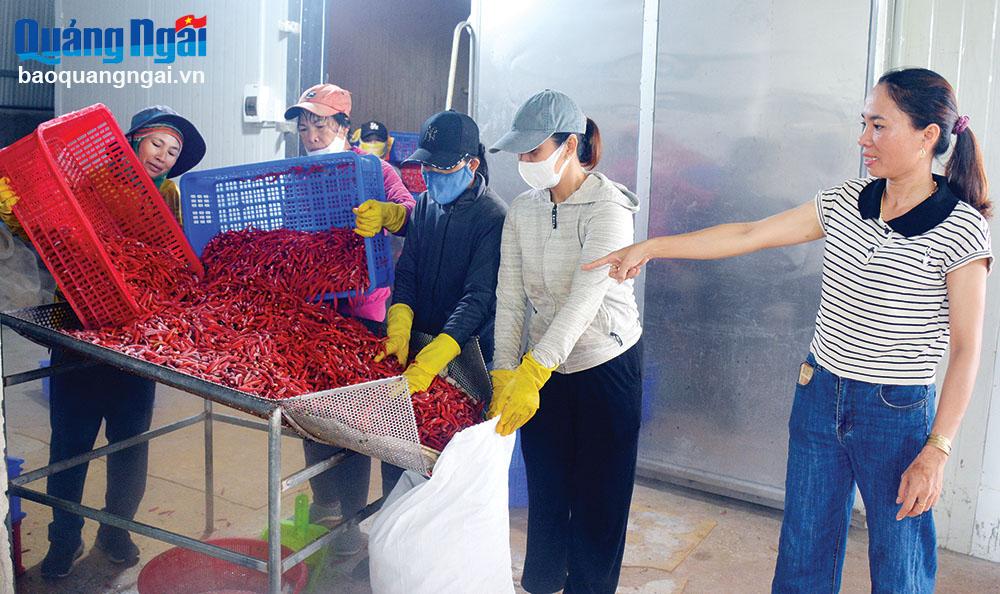 |
| Ms. Do Thi Tuong Vi (right), in An Long village, Duc Hiep commune (Mo Duc), guides workers in packaging chili peppers for export. |
Going out early and coming back late, she clearly understood the hardships of chili farmers. Especially when chili is in season, ripening red in the fields along the Ve River but there are no buyers. Sympathizing with chili growers and her own situation, she tried her hand at chili trading. “Whenever I had money, I invested in buying chili, selling it to agents or taking it to the wholesale market for consumption,” Ms. Vi recalled.
Over time, traders placed orders with her to buy ripe and green chili peppers. To have money to buy chili peppers, Ms. Vi had to borrow a little from each person in the neighborhood. She borrowed the day before, and the next day she sold the chili peppers and paid them back immediately. Seeing that she kept her word and also to ensure the source of goods, some traders exporting chili peppers to China and Korea deposited several hundred million to 1 billion VND in advance for her to buy chili peppers. She understood that if she wanted to receive a large deposit, she needed to connect with the people to have enough sources of goods.
Then, with each passing day, Ms. Vi learned more about business. She soon realized that the demand for chili export market was very abundant, and sometimes, when it was harvest season, chili was ripe in the fields, but there were very few buyers, so she decided to leave the lecture platform and stick with the chili business. Ms. Vi shared, to have good products, I had to set standards to help chili growers focus on taking care of chili plants. Initially, it was to serve the Quang Ngai market, then expand to neighboring provinces.
“Business requires accepting risks. There was a shipment exported to Korea that did not meet quality standards, and I was fined 700 million VND. Through that, I learned a lesson that I must be careful in checking the quality from input to processing, packaging, and exporting on time,” Ms. Vi confided.
Keep your word
I went to Ms. Vi's chili processing facility when she had just returned from the Central Highlands provinces. She went into the factory and assigned some people to go to the provinces to buy chili. The older workers and those with small children did the processing and packaging work, so that the workers could transfer them to trucks for export. Ms. Vi said that South Korea and China were in the cold season, so the price of chili exports at this time was higher than in the dry season.
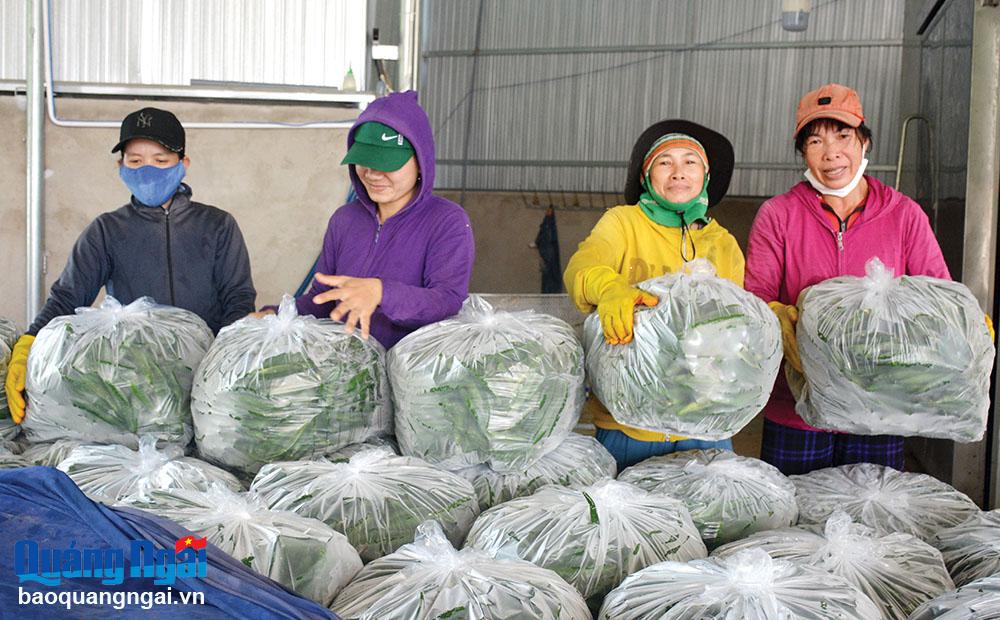 |
| Chili peppers from Ms. Do Thi Tuong Vi's facility have been exported to Japan, Korea, and China. |
| Every year, Ms. Do Thi Tuong Vi purchases about 2,000 tons of chili, processes it and exports it to East Asian countries, earning a revenue of more than 30 billion VND, and a profit of about 4 billion VND. In particular, Ms. Vi's facility provides regular jobs for nearly 100 workers, with an average income of 7 - 9 million VND/person/month. |
To have chili for export, up to 1,000 tons in some years, Ms. Vi has to connect and buy chili in many provinces. From January to July of the lunar calendar, she buys chili in the province. When the rainy season comes, she buys chili in the Central Highlands and northern provinces. This year, chili growing areas in the northern provinces were damaged by floods, so to collect enough chili for export processing, Ms. Vi not only goes to the agents to collect but also sometimes has to go to the gardens of chili growers in Lam Dong, Dak Nong , Dak Lak, and Gia Lai provinces to buy.
“Business must have credibility, no matter how difficult it is, we must still have goods for our partners. Exported products must ensure quality and meet standards. I had to build 4 cold storages to store hundreds of tons of chili to meet customer demand," said Ms. Vi.
Now, Ms. Vi's chili market is not only domestic but also exported to China, Korea, Japan... Every year, Ms. Vi buys thousands of tons of chili, then processes it to meet market demand. Having to collect a lot of goods, Ms. Vi boldly borrowed capital from the Duc Hiep Commune People's Credit Fund to pay chili farmers. Director of the Duc Hiep Commune People's Credit Fund Ly Ngoc Binh commented that Ms. Do Thi Tuong Vi is very reputable in business. Many times, Ms. Vi came to the fund to borrow money, the disbursement unit created favorable conditions for her to operate. She always paid interest and principal on time...
Create jobs for workers
As business gradually improved, Ms. Vi always thought about the difficult years with the encouragement of her neighbors. Therefore, although purchasing chili from both the North and the South, Ms. Vi's chili processing factory was located in her hometown, An Long village, Duc Hiep commune. Each factory had dozens of workers, always bustling with people, motorbikes, and trucks coming and going.
I met Ms. Do Thi Kim Khue (43 years old), in village 2, Duc Nhuan commune (Mo Duc), who talks but picks chili peppers quickly. She said that she has to work hard because she is a contract worker. I have 4 children. Along with raising pigs, chickens and farming, I came here to pick, wash and process chili peppers. I earn 30,000 VND per hour. If I work extra at noon or in the evening, I can earn 300,000 - 400,000 VND per day. I have been working at Ms. Vi's chili factory for many years, with a stable income, enough to cover my family's expenses.
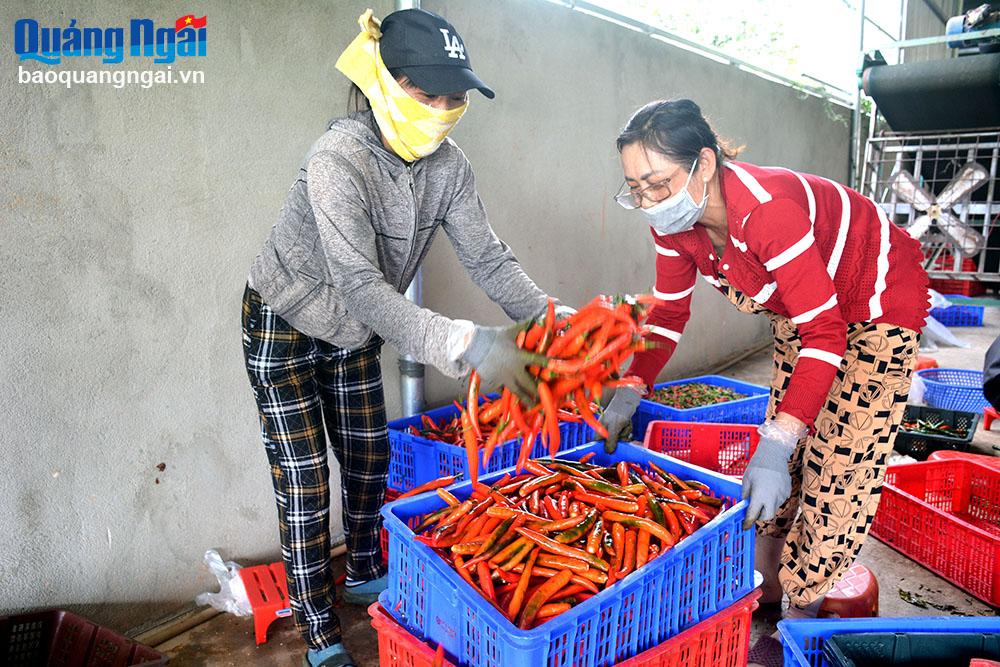 |
| Workers classify chili peppers at Ms. Do Thi Tuong Vi's facility. |
For Ms. Tran Thi Bich Van (31 years old), in village 2, Duc Nhuan commune, Ms. Vi's chili factory gives her the opportunity to stay in her hometown. Previously, Ms. Van and her friends went to industrial parks to find work. Back then, single life was fine anywhere. However, since having a small child, Ms. Van could no longer work far from home. Therefore, every day, Ms. Van takes care of her child, then leaves him with her grandparents, then goes to Ms. Vi's chili factory to work for 3-4 hours. The income is enough to cover the expenses for her child.
In Vi's workshop, there are also old people, picking chili peppers and chatting away. Mrs. Pham Thi Tu (80 years old), in hamlet 2, An Long village, Duc Hiep commune, is stirring the tray of fresh red chili peppers that have just had their stems picked, saying, I used to do these things all the time. My children and grandchildren told me to rest, but seeing that everyone is having a hard time, I stay home and become a burden to them. The work I am doing is not too heavy, I used to help Vi, moreover, I also have some money coming in for breakfast and daily expenses.
Not only does it provide jobs on the spot, Ms. Vi's chili factory also creates conditions for many people to work from home. According to Ms. Vi, every day her chili factory has about a dozen workers who come to pick up chili peppers from the factory for processing. During the picking process, they choose which ones are good and remove the damaged ones. After picking the stems, they go through the process of removing the core, washing, packaging, and freezing.
Looking at Ms. Vi's happy smile when watching everyone working, I know that the joy is no longer limited to her, but has spread to the chili farmers and those who work for her facility during the off-season...
Article and photos: ANH NGUYET
RELATED NEWS:
Source: https://baoquangngai.vn/kinh-te/nong-nghiep/202411/dua-qua-ot-chinh-phuc-thi-truong-dong-a-13f152f/







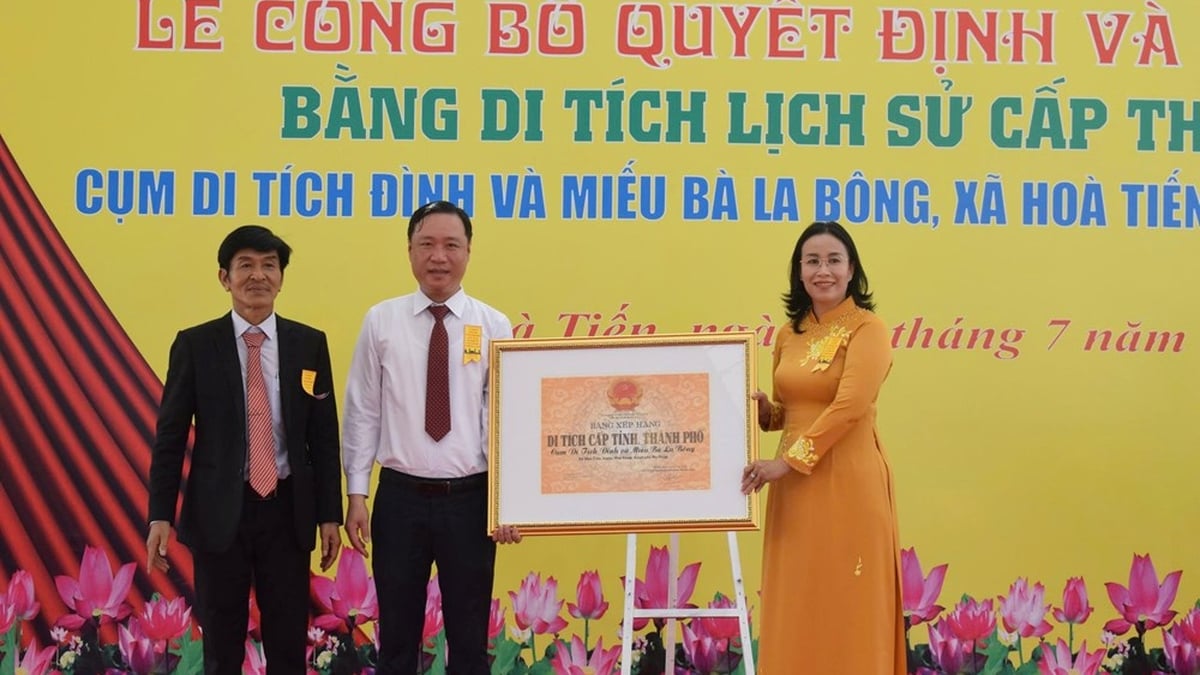

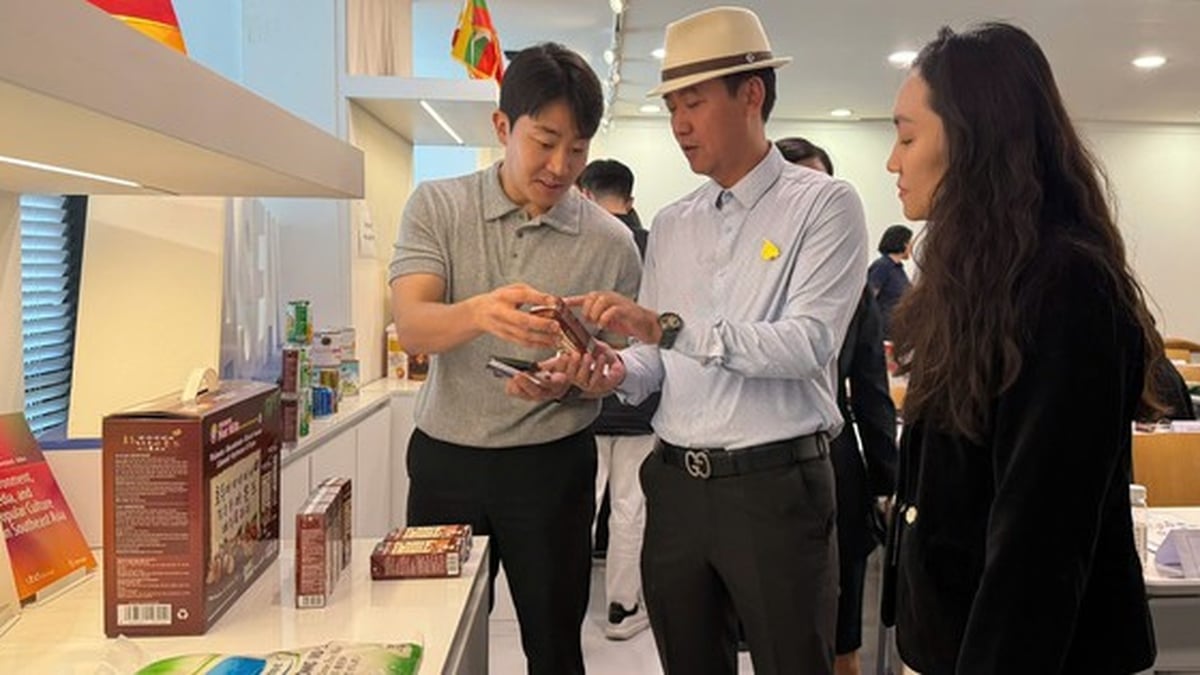

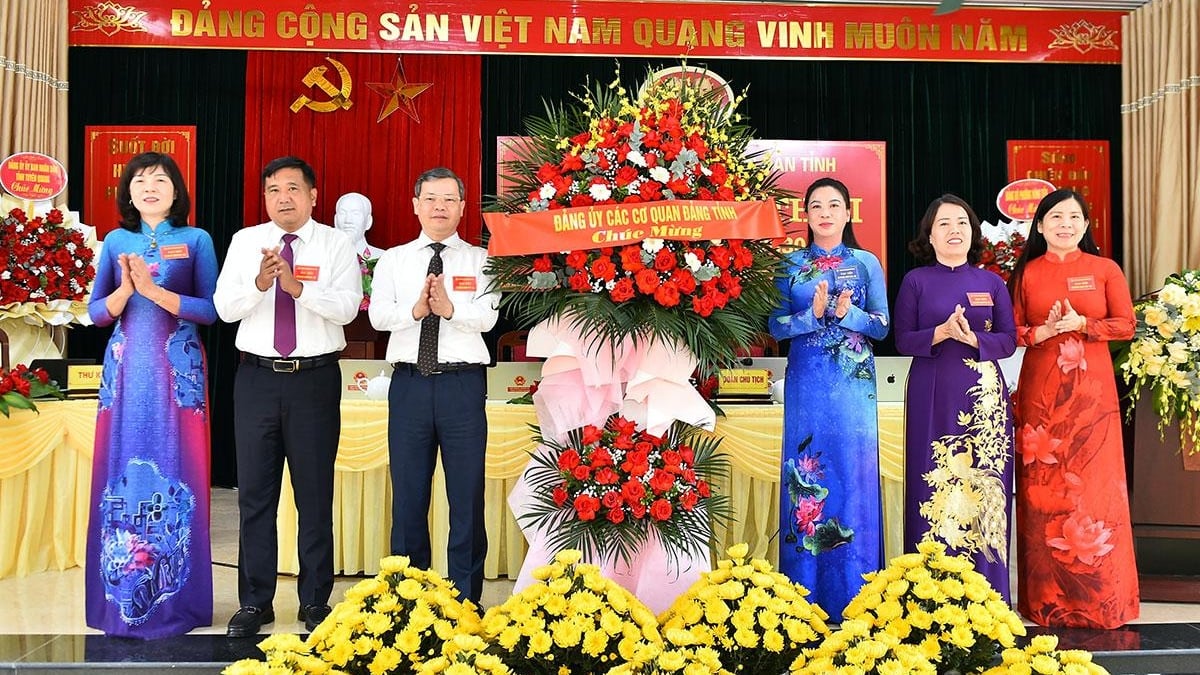




















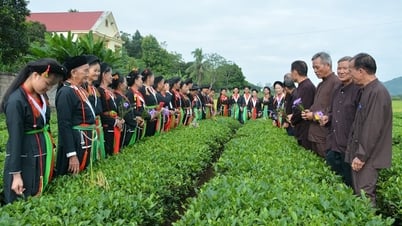

































































Comment (0)